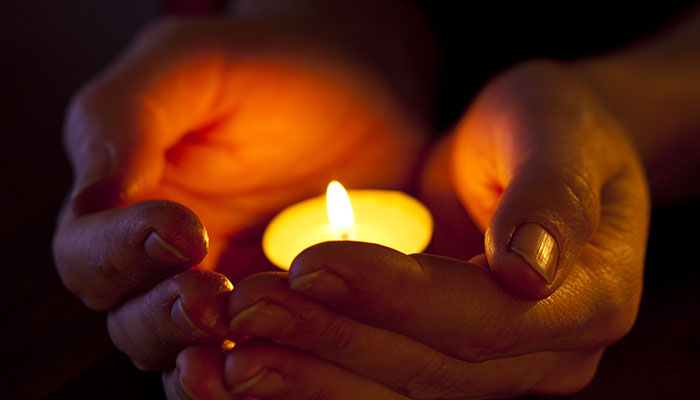When death is near
 Dying is actually a gradual process of the body winding down over the course of a few weeks, with the lungs and heart being the last to go. It’s like moving out of a house. There are rooms you use the least, so they are the ones you pack up first. Move all the boxes out, sweep, and shut the door. Similarly, the body first closes down those organ systems it needs least, such as digestion.
Dying is actually a gradual process of the body winding down over the course of a few weeks, with the lungs and heart being the last to go. It’s like moving out of a house. There are rooms you use the least, so they are the ones you pack up first. Move all the boxes out, sweep, and shut the door. Similarly, the body first closes down those organ systems it needs least, such as digestion.
A few weeks before death, people begin to lose their appetite. Pushing foods doesn’t help. It’s just too much work to eat and digest when the body is focusing so hard on breathing and keeping the blood pumping.
Thinking and awareness fall by the wayside a week or two before. You may notice
- confusion or delirium
- a glassy stare or faraway look
- hallucinations, even talking to people who have already died
- agitation, fidgeting with blankets
- increased time sleeping
Physical changes include
- irregular breathing
- fast pulse but low blood pressure
- hot/cold temperature swings (the body’s thermostat stops working)
- pale blue color to the skin (poor circulation)
- weakness, an inability to get up or turn over
- dark urine and small quantities (the kidneys are shutting down)
The last couple of days are often spent in a twilight sort of sleep, with very little, if any, talking. (The dying do seem to be able to hear, however. And they can feel if you are holding their hand.) Circulation slows, so hands and feet get dark and blotchy. Some people experience a bout of restlessness. Reaching their arms upward is common.
Breathing gets noisy as fluid builds in the lungs. The gurgling is not painful. At the very end, a person may take only one to three breaths in a minute, with lots of space between. And then, at some point, they don’t take another breath. Sometimes the bowels or bladder release.
Return to topHow you can help

During the last few days, families are often inclined to gather around the bedside as a group. Be aware it may be harder for your loved one to let go when surrounded by all their reasons for staying! Consider, instead, taking turns, with one of you quietly present at all times. This way your relative can be monitored for comfort but also has the stillness they need to let go.
You can help most by being a calm, reassuring, and loving presence focused on keeping your loved one comfortable.
Physical comfort
- Offer ice chips or a wet washcloth to suck on. Not eating or drinking can make for a very dry mouth.
- Provide food or drink only if they ask for it.
- Put lip balm or olive oil on dry lips to avoid chapping.
- Keep bed linens clean and dry.
- Help your loved one roll over every two hours to reduce the chance of painful bed sores.
- Keep blankets on hand for bouts of chill and a cool, damp cloth for flashes of heat.
- Have a commode or bedpan nearby in case they need to go to the bathroom.
- Give pain medicines as needed to remain pain free.
Emotional comfort
- Hold their hand—they can still feel.
- Tell them they are loved—they can still hear.
- Thank them for their role in your life.
- Offer or request forgiveness gently, as appropriate.
- Let them know they can let go, that you will be sad, but you will also be all right.
Spiritual comfort
- Engage in rituals of your loved one’s faith.
- Quietly sing songs or pray as they would wish.
Immediately after a death
Call us at 707.364.5285
Upon a loved one’s last breath, you may find yourself a little disoriented. Respect that otherworldliness. This is a sacred moment. Families often just sit in silence for a while. Or share chuckles and sweet memories, tears and hugs. Honor that this is your last time to be with your loved one. Take some time for quiet reflection. Once the ball starts rolling, you won’t have this peacefulness again.
While you wait for hospice to arrive
- Write down the time of death. This may be necessary for death certificates.
- If your loved one is an organ donor, follow the instructions of the institution involved.
- Close the eyes and straighten the limbs. You might want to place a rolled towel under the jaw to help it stay closed.
- Contact those who may want to pay last respects.
- If there are after-death faith traditions, contact clergy to come perform those rituals.
Calling the funeral home
Call only when you are ready for the body to be taken. They may arrive fairly quickly and things will move very fast. Say your final goodbyes before they come. Let the funeral home know if you would like to see your loved one after they are prepared for transportation. The body will be in a black bag, which can be a shock to family members.
After the funeral home staff have gone
- Divide up the phone calls. Split the list so you call only those friends and relatives who were closest. Others can contact more-distant relations.
- Provide for dependents. If your loved one tended to someone else, or had pets, make short-term arrangements for their care.
Contact us at 707.364.5285

